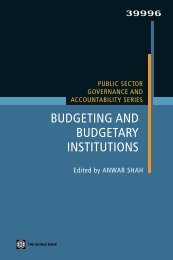Conducting a Participatory Situation Analysis of.pdf - Global HIV ...
Conducting a Participatory Situation Analysis of.pdf - Global HIV ...
Conducting a Participatory Situation Analysis of.pdf - Global HIV ...
You also want an ePaper? Increase the reach of your titles
YUMPU automatically turns print PDFs into web optimized ePapers that Google loves.
Gain access to field sites<br />
Gaining access to field sites for a situation analysis can be<br />
surprisingly challenging in terms <strong>of</strong> the measures needed<br />
to obtain permission and acceptance by key community<br />
representatives. Entering a community to talk about the<br />
care <strong>of</strong> children, especially orphans, can easily trigger suspicion<br />
and/or raise expectations <strong>of</strong> material support.<br />
Several weeks before the interviewer training, the<br />
Advisory Team, in cooperation with administrative <strong>of</strong>ficials<br />
<strong>of</strong> the area, should select field sites. Advisory Team<br />
members, or the Technical Lead, can then ask community<br />
leaders’ permission to bring several interviewers to the<br />
sites. This initial visit to the field site also provides an<br />
opportunity to confer with community leaders to ensure<br />
that expectations are not raised in terms <strong>of</strong> receiving payment,<br />
food, or other forms <strong>of</strong> material support in<br />
exchange for participating in the situation analysis.<br />
After receiving permission to collect data, it is necessary<br />
to make housing and transportation arrangements.<br />
Accommodations for interviewers should be in a place<br />
that community members view as neutral (e.g., church<br />
guesthouse). Such arrangements are not easy, even when<br />
the duration <strong>of</strong> the fieldwork is short. Often a community<br />
leader will <strong>of</strong>fer to house the interviewers in her or his<br />
own accommodations. Although this is a generous gesture,<br />
efforts should be made to avoid such a situation<br />
because it is not appropriate for interviewers to live with<br />
anyone who might be viewed as influential in the community<br />
because such a perception can undermine the<br />
interviewers’ need for a reputation <strong>of</strong> impartiality with<br />
respondents. Furthermore, this type <strong>of</strong> arrangement can<br />
lead to violations <strong>of</strong> interviewer-informant confidentiality.<br />
Before their first visit to the field sites (or when on the<br />
way to visit the sites), the new interviewers should introduce<br />
themselves to important administrative <strong>of</strong>ficials and<br />
inform them <strong>of</strong> their arrangements to work with community<br />
leaders. When the interviewers arrive at the field<br />
sites, they should settle into their accommodations and<br />
make introductory visits to community leaders. After<br />
these introductions, community leaders’ collaboration<br />
with the research team will be authorized and data collection<br />
can <strong>of</strong>ficially begin.<br />
Experience in Nigeria revealed that the labor or work<br />
schedules <strong>of</strong> people at some field sites can affect the timing<br />
for interviewing heads <strong>of</strong> households (e.g., interviews<br />
may need to be conducted at night). Interviewers must<br />
also consider their own safety and social events (e.g.,<br />
funerals and weddings) that would make interviewing<br />
inappropriate.<br />
Incentives<br />
A decision must be made whether or not to give participants<br />
an incentive (e.g., cash, food, vouchers), both to<br />
encourage their participation and to thank them for their<br />
participation. There are concerns that incentives amount<br />
to bribes, so if an incentive is used, it must not be so<br />
enticing that participants feel coerced into participating<br />
in something they might otherwise not consider—sometimes<br />
referred to as economic coercion. Also, providing<br />
incentives may undermine using the situation analysis<br />
findings as an impetus for community mobilization.<br />
The use <strong>of</strong> incentives must take into account the usual<br />
practices within a community. Previous situation analyses<br />
based on the tools in this Guide did not include<br />
incentives for participants.<br />
Some incentives that field interview teams can use to<br />
“give something back” to respondents include helping<br />
with tasks and work in exchange for the participants’<br />
time, arranging for shorter waiting times in free care<br />
services, <strong>of</strong>fering extra home-based care visits or special<br />
training, or providing access to group counseling or education<br />
sessions through a community-based NGO.<br />
Community leaders may be a source <strong>of</strong> ideas for appropriate<br />
incentives.<br />
Ensure confidentiality and informed consent<br />
Privacy and confidentiality <strong>of</strong> information from the<br />
community must be maintained at all times. Winning<br />
the trust <strong>of</strong> the community is essential for obtaining<br />
valid results. The situation analysis respondents must<br />
feel confident that the information they provide will be<br />
kept confidential; if they do not, they may hesitate to<br />
give accurate information. In some situations,<br />
<strong>HIV</strong>/AIDS-infected or -affected households may be suspicious<br />
<strong>of</strong> institutions and individuals they view as<br />
threatening. It is, therefore, critical that the field interview<br />
team build a relationship with community leaders<br />
and key informants so that there is a basic sense <strong>of</strong> trust<br />
between them. In some settings, this may require active<br />
involvement by the “gatekeepers” in planning and conducting<br />
the analysis.<br />
Before conducting an interview, permission must be<br />
obtained from each respondent who participates; this<br />
permission is called “informed consent.” Interviewers<br />
<strong>of</strong>ten obtain such consent by reading a statement about<br />
the interview process to the respondent and asking for<br />
his or her signature to indicate their agreement to participate.<br />
The statement normally describes the nature <strong>of</strong> the<br />
data collection, the way the results will be used, the risk<br />
to the respondent, and the benefits. The statement<br />
<strong>Conducting</strong> a <strong>Participatory</strong> <strong>Situation</strong> <strong>Analysis</strong> <strong>of</strong><br />
Orphans and Vulnerable Children Affected by <strong>HIV</strong>/AIDS<br />
51















